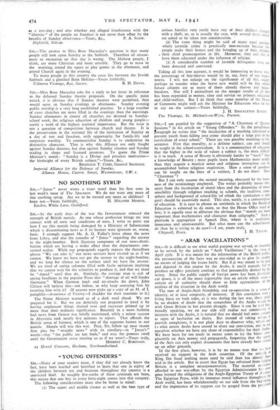Sta,—I am puzzled by the suggestion of " A Chairman
of Quarter Sessions " in his article on " Young Offenders."' In the penultimate Paragraph he writes that " the inculcation of a teaching calculated to prevent youth from falling into crime should play a large part in the -curriculum of every school." There are two possible meanings to this sentence. First that morality, as a definite subject, can and should be taught in the school-curriculum. It is a commonplace of education that the higher in the scale of values a subject is, the more difficult is it to teach. A sense of Beauty is obviously harder to "teach" than a knowledge of Botany ; most pupils learn Mathematics more readill than they acquire a musical sense and religious instruction can be accomplished before religious inspiration. How a sense of goodness can be taught on the lines of a subject, I do not know. Does " Chairman "?
But I can only assume the second meaning, obscured by the loose- ness of the terminology employed. The writer probably means that apart from the inculcation of moral ideas and the deepening of moral sensibility through religious teaching in schools, the tradition, atmo- sphere and background of school-life (of which the curriculum is onif part) should be essentially moral. This also, surely, is a commonplace of education. It is easy to phrase an antithesis in which the Board of Education is exhorted to do more, so that the Home Office need do less; it is equally easy to alliterate the obvious that " morals are more important than mathematics and character than caligraphy." Such a platitude is appropriate at Speech Day, where it is traditional. innocuous and unanswerable. But what more can the schoolmaster do than he is trying to do now?—I am, yours truly,






























 Previous page
Previous page